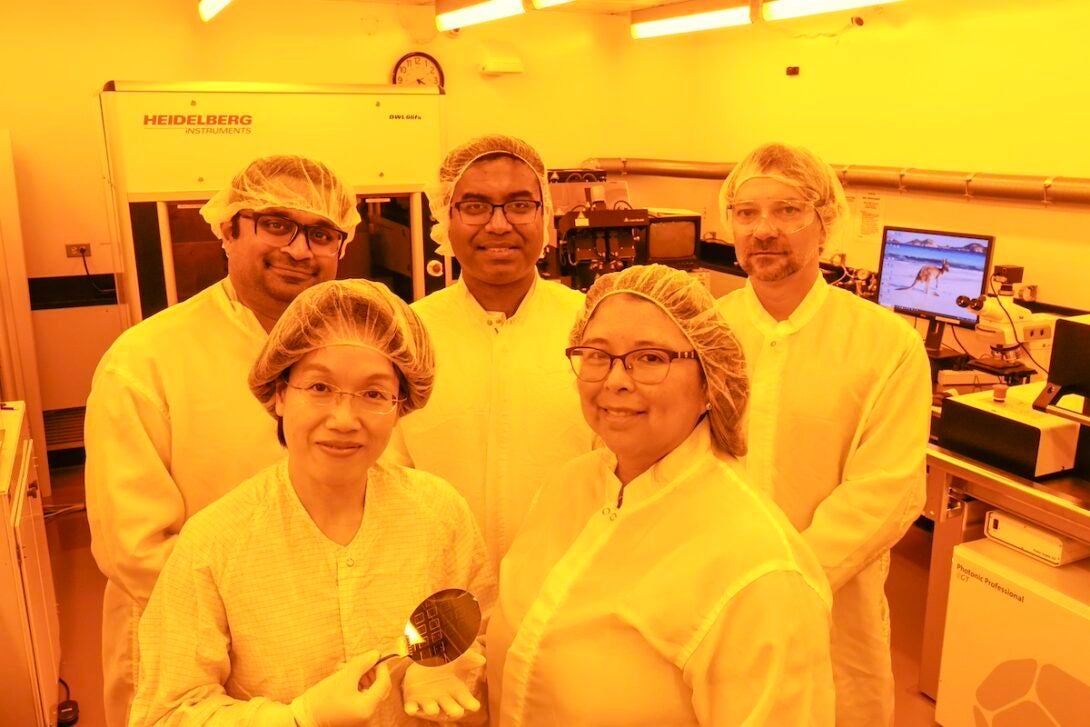UIC joins semiconductor workforce development center meeting national demand
UIC joins semiconductor workforce development center meeting national demand

The push to increase semiconductor manufacturing in the United States will create intense demand for skilled workers over the next decade. The University of Illinois Chicago will help meet that demand by participating in a statewide effort with other universities, community colleges and electronics companies training students to make the leap into the trillion-dollar industry.
The U.S. Department of Commerce announced the launch of the Illinois Semiconductor Workforce Network in September. The network, led by the University of Illinois Urbana-Champaign, is one of seven groups chosen for funding by the National Semiconductor Technology Center under the Workforce Partner Alliance program enabled by the CHIPS and Science Act of 2022.
The UIC College of Engineering will play a critical role, training students from UIC and Chicago-area community colleges in its Nanotechnology Core Facility and co-designing new undergraduate courses and curricula with industry partners. The UIC faculty members on this award are Igor Paprotny, Debjit Pal, Aritra Banerjee, Junxia Lucy Shi and Carmen Lilley.
“A student’s learning curve will begin right here at UIC and our partner institutions, so by the time they reach industry, they are almost ready to deliver from day one,” said Pal, assistant professor of electrical and computer engineering and one of five faculty from the College of Engineering involved in the network. “We will build on what already exists and take it to the next level so that we can make a prominent contribution toward domestic semiconductor workforce development.”
The new program will expand on current training and research activities in the Nanotechnology Core Facility’s state-of-the-art cleanroom — a 3,000-square-foot controlled environment where electronic chips and devices can be fabricated and characterized. Today, UIC engineering students in a microdevices and micromachining technology course get hands-on experience with the same advanced equipment that leading technology companies use.
Through the Illinois Semiconductor Workforce Network, that experience will be extended to students at local schools such as the City Colleges of Chicago and Chicago State University through paid internships. Cleanroom experiments will also be integrated into additional UIC electrical and computer engineering courses, and the facility will add new instruments and capabilities that align with cutting-edge industry practices.
“We want to expose the students early on to semiconductor manufacturing, to get them excited about these state-of-the-art technologies and tools,” said Paprotny, associate professor of electrical and computer engineering and faculty research director of the nanotechnology core facility. “In the lab, they get to see it and touch it, and that’s really exciting.”
The College of Engineering will also create new courses and training programs in collaboration with industry partners, including GlobalFoundries, Synopsys and AMD. These co-designed curricula will help students graduate with the skills they need to immediately qualify for jobs at semiconductor companies, said Banerjee, assistant professor of electrical and computer engineering.
“We need to get feedback from the industry partners and make sure that we are revising the curriculum and building new courses that align perfectly with where the industry sees the future needs,” Banerjee said. “So that when the students finish their training and graduate, there is a perfect match — they are ready to contribute to those activities and the industry is ready to hire them.”
Threaded throughout the new programs will be a focus on broader participation in the semiconductor industry. Currently, Black and Latino workers make up less than 13% of the semiconductor workforce. Less than a quarter of workers in the industry are female.
“The university mission is to provide the broadest access to the highest level of education and research excellence for students and residents of Illinois,” said Lilley, associate professor of mechanical and industrial engineering, who will oversee diversity, equity and inclusion programs at the center. “This grant aligns with our university mission and addresses our national security and economic need to train a U.S. workforce in the semiconductor industry. Outreach programs and inclusive learning environments serve to address these national needs by providing students access to educational opportunities and preparing them to be workforce-ready.”
This story first appeared on UIC Today 11/18/24